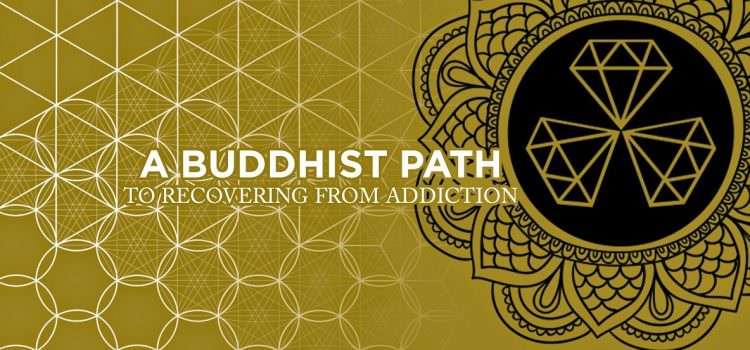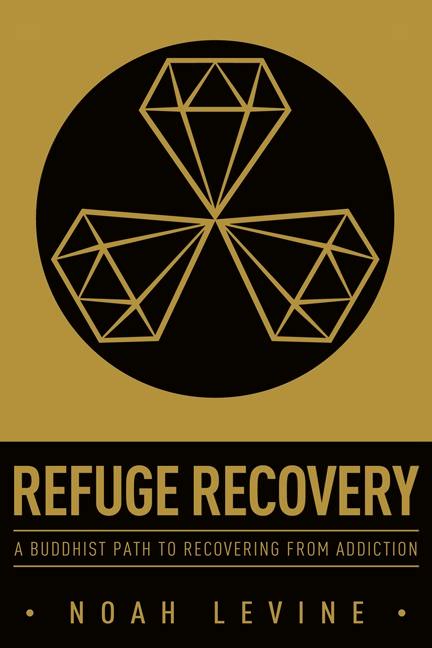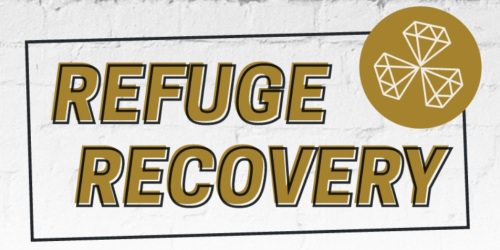Refuge Recovery

Published on January 2, 2019 on Recovery Ways
What’s a Refuge Recovery Meeting Like?
After leaving treatment, attending mutual aid meetings are a great way to continue your recovery. You meet other people who are also in recovery, which helps you build your sober network. Attending meetings also gives you a chance to review what you learned in treatment. At the very least, attending regular meetings is a good reminder that recovery from addiction is an ongoing process.
12-step programs such as AA are the best known and most widespread kind of mutual aid group. There are more than 100,000 AA groups alone, not counting other 12-step programs such as NA. However, the 12-step approach isn’t for everyone. Many people have legitimate differences with the 12 steps, including their reliance on the disease model of addiction and their insistence on the surrender to a higher power. For these people, an alternative approach may be more effective.
One alternative to 12-step programs is Refuge Recovery. Refuge Recovery is a relatively new organization that has quickly grown in popularity in recent years. It is a recovery method based on Buddhist practice. The Four Noble Truths of Refuge Recovery are: 1. Addiction creates suffering, 2. The cause of addiction is repetitive craving, 3. Recovery is possible, and 4. The path to recovery is available. Refuge Recovery uses mindfulness meditation and loving-kindness meditation to reduce cravings, regulate emotions, and build social connection. Meetings are free and confidential and you don’t have to be a Buddhist to attend.
The meetings themselves are fairly simple. They are peer-led, which means meetings are facilitated by a member who is familiar with the Refuge Recovery philosophy and format. No one is expected to identify as an addict or alcoholic. Meetings start with a short introduction to Refuge Recovery, along with a reading of the Four Noble Truths and the Eightfold Path. Then, everyone participates in a 20-minute group meditation.
After the meditation, the chairperson will either introduce a reading from the literature or a speaker will speak about a recovery topic. Then, the meeting is opened up to group sharing. Each person who wants to speak will talk for a few minutes about any recent challenges or triumphs related to addiction. As with 12-step sharing, cross-talk, such as interrupting, asking questions, or offering advice, is discouraged. At the end of the meeting, you can make a donation if you want. The average donation is about five dollars.
Many people find Refuge Recovery more open-minded and less dogmatic than 12-step meetings. There’s no need to choose one or the other. Many people attend both. Neither is there any reason to fear religious entanglements, as people of all religions, or no religion, are welcome.
My First Refuge Recovery Meeting
This article has been mildly revised
By Olivia Pennelle
Published on June 7, 2017 on The Recovery Village
I got sober in a 12-step modality, but had recently come to an impasse. I was fed up with hearing the same words from their literature – which I struggled to relate to – over and over again. I was tired and I wanted more for my recovery. My recovery had become stale and repetitive and I couldn’t continue in that way – but I wasn’t sure which way to turn. I felt lost.
I was fearful of being ousted for thinking beyond the 12-step modality; and being labelled ungrateful, or somehow lacking humility. I waited for the words “you’re headed for a relapse” said to those who had chosen a different path.
I dared to put aside my fears – and dogma – to explore other modalities of recovery. I chose to begin with Refuge Recovery.
Before walking into my first Refuge Recovery meeting, I had little conception of how it worked – other than it being founded upon some Buddhist principles and that Noah Levine had created it. I had heard great things. I was slightly daunted – but more excited – at the possibility of reinvigorating my recovery with something completely new to me.
As I walked in I introduced myself to other members and was welcomed with compassion, and without judgement. While I respect the anonymity and sanctity of what is shared in a meeting, I can say that I was not the only person who was walking my path of seeking something different.

Refuge Recovery – A Buddhist Path to Recovering From Addition, by Noah Levine, was published in 2014. Click on the image to access the book on Amazon.
I took a pamphlet from the table which explained “Refuge Recovery is a mindfulness-based addiction recovery community that practices and utilizes Buddhist philosophy as the foundation of the recovery process.” The main inspiration and guiding philosophy for its program are the teachings of Siddhartha (Sid) Gautama – otherwise known as the Buddha, and his teachings as Buddhism. Sid believed that “the root cause of suffering is uncontrollable thirst or repetitive craving.”
The Refuge Recovery program does not ask anyone to believe anything – only to trust the process and do the hard work of recovery. Their practice of Buddhism they describe as a non-theistic approach to spiritual practice “that teaches us that we all have our own power to relieve suffering through our own efforts. The core teachings of Buddhism are the Four Noble Truths and the Eightfold Path, in which the practices of mindfulness and compassion play key roles.”
The Four Noble Truths are: Addiction creates suffering; The cause of addiction is repetitive craving; Recovery is possible; and The path to recovery is available.
The Eightfold Path is:
- Understanding
- Intention
- Communication/Community
- Action/Engagement
- Livelihood/Service
- Effort/Energy
- Mindfulness/Meditations
- Concentration/Meditations
As the meeting time approached, the room filled and every seat was taken. I observed the familiar sight in a meeting where people take their seat, exhale deeply, and relax their shoulders. I noticed that people seemed more grounded, more present – which made me sit upright with an eagerness to learn more.
I was taken by their mindfulness based approach to recovery, which they define as:
Present-time, nonjudgmental, investigative, kind and responsive awareness. To be mindful of the present-time experience of our thoughts, intentions, and actions, we must continually train and redirect our attention to the here and now. Mindfulness teaches us to see clearly and respond wisely.
This spoke to me so loudly. I am a person who lives in the future – consumed with planning, list-making, and the things I have to do. I spend my life looking forward. Mindfulness is precisely what I need more of in my recovery.
The meeting began with a twenty-minute meditation – which I found heavenly. I found myself unraveling and becoming in-tune with my body. I felt grounded, present, and deeply relaxed as the meditation finished. My endless thoughts and solution-oriented brain was finally quiet. I felt peace of mind.
I often ask myself why I don’t find the time to build this practice into my life when it is so evidently beneficial to my recovery. I just find other things to do – life gets in the way. Incorporating its practice into a meeting is nothing short of genius – not least because of its calming nature, but because it allows you to connect with yourself.
I couldn’t think of a better state to share from: where you are connected to your body, mind, and spirit. Surely that trifecta of connection is truth in its purest form? It is for me. In truth is the place I strive to be: where I operate in my highest purpose, where I feel a deep sense of connection to myself and the world around me.
In some respects, truth-seeking has become ingrained in my daily thoughts, behavior, and actions – where I examine if I am acting in accordance with my values and purpose. Not always though; sometimes I feel really disconnected and struggle to sift through my feelings. This is where the practice of mindfulness – particularly meditation – is most beneficial. Perhaps this is why I found the meeting so useful.
The second part of the meeting format was an open forum to share either on the meditation – this particular meditation was mindfully observing the present without judgement or seeking to label what your senses identified – or whatever is relevant to you in that moment. This is not dissimilar to a traditional 12-step meeting. However, what I particularly liked is that there is no need to identify by anything other than your name – not an addict, or alcoholic. I find such labeling self-limiting and it refers to a person that I used to be. I suffer with addictive patterns of behavior, but I am not in active addiction today. I find it more empowering to refer to myself as Olivia, or Liv.
As the meeting closed, I felt alive, energized, connected, and compelled to seek out more meetings. That’s exactly the breath of fresh air that I was looking for.
What is Refuge Recovery?
Refuge Recovery is a non-profit organization grounded in the belief that Buddhist principles and practices create a strong foundation for a path to freedom from addiction. This program is an approach to recovery that understands: All individuals have the power and potential to free themselves from the suffering that is caused by addiction.
Click on the this image to visit the Refuge Recovery website:
Whether this path is familiar to you or new to you, we all benefit from the support of a community of peers who share this journey. For that reason, Refuge Recovery seeks to support those on this path by building an extensive and comprehensive network of Refuge Recovery meetings and communities that practice, educate, and provide Buddhist-inspired guidance and meditations for anyone seeking recovery from addiction.


























Great article. Before I found and was directed to AA at 35, I had read many different paths of philosophy including the Bible. So the accumulated process of spirituality, forgiveness, etc. in AA was not as hard for me to understand.
I avoided the distractions of the religious inclusions in meetings by understanding the loving nature in its meanings. The more religious and the non religious people I encountered in the meetings, struggled with the religious talk having had past ugly relationships with churches and its members. I had been taught to be open minded, so I call myself fortunate.
Any way you find sobriety and a better life should be applauded. AA worked for me, but the many forms of recovery found in literature and psychology also contributed in leading me to AA. This program brought together all I had learned and filled in the blanks. It worked for me, forever grateful.
As per the Buddhist Funeral Traditions:
Buddhists believe death is a natural part of the life cycle. They believe that death simply leads to rebirth. This belief in reincarnation – that a person’s spirit remains close by and seeks out a new body and new life – is a comforting and important principle. For Buddhists death is not the end of life, so it is not something to be feared. Where and how a person is reborn depends on their good and bad actions in past lives.
Karma: According to Buddhism, everything that happens is the result of Karma – the law of cause and effect. Every action throughout a person’s lifetime, both good and bad, has an effect on their future. The way a person lives his or her life also affects the way they die. So it is very important for a Buddhist to prepare for death by living in a good and kind manner. They are encouraged to be true to themselves and to care for and about those around them. This is how they can achieve calmness and control at their time of death.
Interesting, and true enough, Vic. However no beliefs are required in Refuge Recovery. From the Introduction:
Much of the process of Refuge Recovery involves meditation, living in the now, and sharing with others.
Thanks Roger for publishing these articles about Refuge Recovery. My son now clean and sober since 2005 and I have attended a Refuge Recovery meeting in Tucson when I visit him a couple of times a year.
One aspect of their meetings I especially appreciate is that they are open to anyone who has a problem with addiction, regardless of the substance abused, as well as those struggling with a loved one who is addicted.
I was needing more secular meeting options in my town. I had learned about Refuge Recovery but there were none close by. I began a quest to start one. I read the book and found all the resources for doing so. Also a kit can be purchased. I found several people, 4 are suggested, to help me. Together we created Refuge Recovery Orlando.
What I like most about this program is all are welcome, and the opportunity to learn and practice meditation. Meditation has slowly become a major tool in my box as I found, over time, the benefits. It’s much easier to start one of these meetings than AA because there is no group ID to be registered. I simply went to the meeting lists on the website and submitted the meeting details. No questions were asked. Also, many of the groups have FB pages where members share info and communicate generally. Refuge Recovery is an anonymous type program up to the point of FB. I now live in Santa Fe, NM where there are 4 meetings each week. I am thrilled to have so many options. There are online meetings everyday, per the website.
Ironically, I’m now finding the necessity to start a secular meeting here. HELP!!
In 1991, my early exploration into AA send me searching for other options. The internet of that era was called the library, and I found some interesting reading. Unfortunately, any groups—SOS, Rational Recovery, etc. had no presence in the Toronto area, although it was a metropolis of 3 million.
Chicago, Los Angeles, and New York were the meccas of diverse choices. That did me little good.
I’m convinced of the value of support groups, and the history of addiction/alcoholism treatment backs that up. I’ve done well in AA in spite of being a round peg in a square hole. It’s great to see a widening of the gateway, and entirely new gateways.
If it wasn’t for my sponsor in 2009, who introduced me to the Dharma and it’s different view of spirituality, I wouldn’t have gotten sober. It doesn’t diminish the fact that there’s many good people in AA and their support saves lives. But it’s the cornerstone of the Dharma that clinging and ignorance causes most of the suffering, no matter how well intentioned. I don’t like bashing AA, it sets my mind in a negative place and makes me feel a little like don quixote.
I’ve come to a crossroads in my spiritual growth in which AA has become a nice place to visit, but I wouldn’t want to live there. Someone tried to start a Refuge Recovery Meeting but like AA; it takes an addict to help an addict. So I’m starting a Refuge Recovery Meeting May 4, Saturday mornings at 10 at First Unitarian Church Hamilton.
This quote covers my sentiments…
I do not completely understand the approach described here. Is alcoholism/addiction not considered a disease? If not, what is it considered to be? Is continuous abstinence part of the approach? Haven’t listened to the podcast; anyone who has please let me know if the podcast answers these questions.
“Refuge Recovery is a community of people who are using the practices of mindfulness, compassion, forgiveness and generosity to heal the pain and suffering that addiction has caused in our lives and the lives of our loved ones.
We feel confident in the power of the Dharma, if applied, to relieve suffering of all kinds, including the suffering of addiction. These meetings are appropriate for anyone in recovery, or interested in recovery. Ongoing weekly meetings are open to anyone interested in Recovery from addiction of all kinds. No Meditation Experience is Necessary.”
What is the “power of the Dharma”? How is it like/unlike AA’s higher power concept?
The dharma is the teaching. The literature. I recommend a visit to the website. Refugerecovery.com. You will find a nutshell video.
When I went to refugerecovery.com there was a blank web page with “Coming soon.”
Sorry. refugerecovery.org